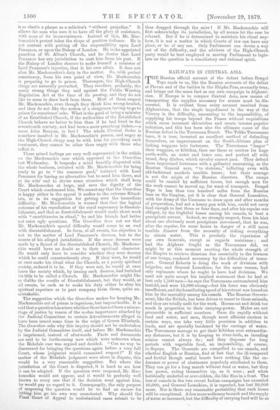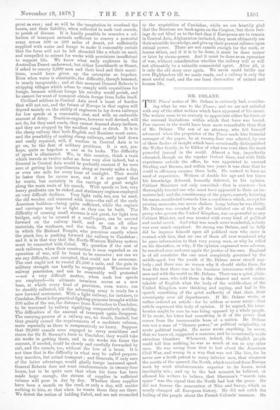RAILWAYS IN CENTRAL ASIA.
THE Russian official account of the defeat before Dengel Tepe reads to us, like the Russian accounts of the defeat at Plevna and of the battles in the Shipka Pass, as exactly true, and brings out the same fact as our own campaign in Afghani- stan. If Europe is to conquer Central Asia, new means of transporting the supplies necessary for armies must be dis- covered. It is evident from every account received from Afghanistan, that the single impediment in the way of the Viceroy is the difficulty, amounting to the impossibility, of supplying his troops beyond the Passes without requisitions which cause incessant skirmishes and create intense popular irritation, and this has been also the ultimate cause of the Russian defeat in the Turcoman Desert. The Tekke Turcomans have, it is true, invented an excellent method of defending themselves, an improvement on the South-African plan of linking waggons into fortresses. The Turcomans " laager " their waggons, or kibitko.a, then use them as centres for huge earth-walls, an outer and inner one, and perfect all with broad, deep ditches, which cavalry cannot pass. They defend these improvised fortresses with a gallantry amounting, as the Russian General says, "to stoicism," inflicting even with old-fashioned muskets terrible losses ; but their courage
is not the origin of the Russian disasters. The camps could be carried by sufficient forces, but enough men for the work cannot be moved up, for want of transport. Dengel Tepe is less than two hundred miles from the Russian base on the Caspian, yet it is clear that General Lomakine, with the Army of the Caucasus to draw upon and after months of preparation, had not a heavy gun with him, could not carry food enough to last three or four days, and after his repulse was obliged, by the frightful leases among his camels, to beat a precipitate retreat. Indeed, we strongly suspect, from his hint about one obviously most precipitate movement, that he was, after the repulse, for some hours in danger of a still more terrible disaster from the necessity of risking everything to obtain water. This is precisely the experience of our own Generals, except as regards resistance ; . and had the Afghans fought as the Turcomans did, we might be at this moment exerting the whole strength of the Empire to retrieve disasters due essentially to the fewness of our troops, rendered necessary by the difficulties of trans- port. General Roberts is doing the work of divisions with brigades, and General Lomakine, for the same reason, had only regiments where he ought to have had divisions. We need not quite accept his implied statement that he had at best only 1,500 men—he says the Turcomans outnumbered him tenfold, and were 15,000 strong—but his force was obviously insufficient, and the humiliating speed of his retreat was forced on him by the mortality among his camels. The Russian Govern- ment, like the British, has been driven to resort to these animals, and they are totally unfit for the work. Horses eat and drink too much in proportion to their carrying-power. Mules are not procurable in sufficient numbers. Oxen die rapidly without food and water, and men, though most efficient carriers in certain ways, can take very little provision in addition to loads, and are specially burdened by the carriage of water. The Turcomans manage to get their kibitkas over extraordin- ary distances, but it is by keeping to river-beds, as invading armies cannot always do ; and they dispense for long periods with vegetable food, an impossibility, of course, to Sepoys. The Generals are compelled to use camels, and whether English or Russian, find at last that the ill-tempered and fretful though useful beasts have nothing like the en- durance or power of abstinence popularly attributed to them. They can go for a long march without food or water, but they lose power, eating themselves up, as it were ; and when habitually underfed or over-ridden, die like flies in a frost. The loss of camels in the two recent Indian campaigns has exceeded 40,000, and General Lomakine, it is reported, has lost 20,000 more. Nor is there any reasonable probability that such losses will be exceptional. A few more wells may be sunk and the supply of water so incremed,but the difficulty of carrying food will be as great as ever ; and so will be the temptation to overload the beasts, and their liability, when collected in such vast crowds, to perish of disease. It is hardly possible to conceive a col- lection of transport animals sufficient to convey a powerful army across 400 or 500 miles of desert, yet sufficiently supplied with water and forage to make it reasonably certain that the force will not be left stranded like a whale on sand, and compelled to retreat for weeks with provisions insufficient to support life. We know what early explorers in the Australian Desert underwent, but either Leuchhardt or Stuart, if asked to convey 2,000 men and their food and their muni- tions, •would have given up the enterprise as hopeless. Even when water is obtainable, the difficulty, though lessened, is nearly insuperable ; and at this moment General Roberts is stripping villages which refuse to comply with requisitions for forage, because without forage his cavalry would perish, and he cannot for want of transport obtain forage from India itself. Civilised soldiers in Central Asia need a beast of burden that will not eat, and the future of Europe in that region will depend mainly on the ability of engineers to lay down railways for low speeds at a reasonable cost, and with an endurable amount of delay. Traction-engines, however well devised, will not do, for they need roads, they cannot descend sharp inclines, and they are stopped by the smallest canal or ditch. It is to the cheap railway that both English and Russians must come, and the possibility of making cheap railways, easily laid down and easily repaired, will, if warfare in Central Asia is to go on, be the first of military problems. It is not, per- haps, quite so hopeless a one as its looks. The difficulty of speed is eliminated. We, in this country, think a train which travels at twelve miles an hour very slow indeed, but a General in Central Asia would be perfectly content if he were sure of getting his impedimenta along at twenty miles a day, or even one mile for every hour of sunlight. That would be faster than he moves now, and it is not speed that he wants, but certainty in the carriage of great weight along the main route of his march. With speeds so low, very heavy gradients can be risked, and Stationary engines employed on very difficult declines. Very light rails, too, can be used, the old wooden rail veneered with iron—the rail of the early American builders—being quite sufficient, while the engines and carriages may be as light as they can be built. The difficulty of crossing small streams is not great, for light iron bridges, only to be crossed at a snairs-pace, can be carried forward on the railway itself, and so can all other materials, the workmen, and the tools. That is the way in which Sir Richard Temple, who perceives exactly where the pinch lies, is pushing forward the railway to Candahar ; and it is in that way that the North-Western Railway system
• must be connected with Cabal. We question if the cost of such railways, when their construction is once regarded as an operation of war, will be found to be excessive ; nor can we see any difficulty, cost excepted, that could not be overcome. The cost ought not to exceed £1,500 a mile, and the gain in military strength can hardly be exaggerated. Wherever the railway penetrates,. and can be reasonably well protected —not a very difficult matter, when such low speeds are employed—its ultimate terminus serves as a new base, at which every kind of provision, even water, can be steadily collected, till the advancing army is ready for a new forward movement. W. ith a light railway, for instance, to Candahar, Herat is for practical fighting purposes brought within 300 miles of the sea, the distance from Kurrachee to Candahar, to be traversed by railway signifying comparatively nothing. The difficulties of the amount of transport again disappear. The carrying-powers of a railway are, no doubt, limited, but they greatly exceed the requirements of a moderate column, more especially as there is comparatively no hurry. Suppose that 20,000 camels were engaged to carry munitions and stores for Sir D. Stewart's force to Candahar, they would take six weeks in getting there, and in six weeks ten times the amount, if needed, could be slowly and carefully forwarded by rail, and the camels, too, without the loss of a beast. It is not time that is the difficulty in what may be called prepara- tory marches, but actual transport ; and Generals, if only sure of the latter advantage, would gladly forego increased speed. General Roberts does not want reinforcements in twenty-four hours, but to be quite sure that when his force has been made large enough, the stream of supplies in sufficient volume will pour in day by day. Whether those supplies have been a month on the road, or only a day, will matter nothing to him, so that when he wants them they are there. We detest the notion of holding Cabul, and are not reconciled
to the acquisition of Candahar, while we are heartily glad that the Russians are back again on the Caspian ; but those feel- ings do not blind us to the fact that if Europeans are to remain in Central Asia, Afghanistan included, they must ultimately use their scientific knowledge, and give up their present reliance upon animal power. There are not camels enough for the work, or horses either, and if it is to be done, it must be done sooner or later by steam-power. And it must be done as an operation of war, without consideration whether the railway will or will not ultimately be a valuable commercial agent. After all, it is only the old story over again. We never could bridle our own Highlanders till we made roads, and a railway is only the most useful road, and the one least destructive of animal and human life.



































 Previous page
Previous page